Carl E. Olson's Blog, page 102
April 7, 2014
Pope Francis canonizes Three New Saints of the Americas
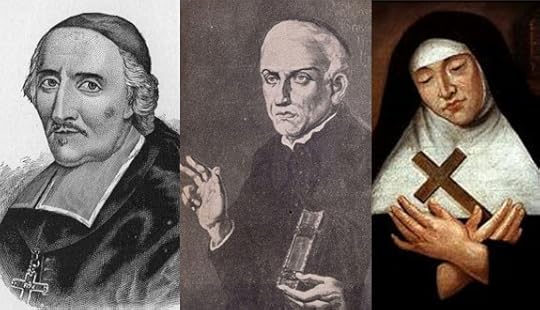
Left to right: Sts. Francois de [Montmorency-]Laval, José de Anchieta, and Marie de l’Incarnation
Pope Francis canonizes Three New Saints of the Americas
By Michael J. Miller | CWR Blog
From the Vatican Information Service:
Vatican City, 3 April 2014 (VIS) – [On Thursday] morning the Holy Father Francis received in audience Cardinal Angelo Amato, S.D.B., prefect of the Congregation for the Causes of Saints, during which he extended the liturgical cult of the following Blesseds to the Universal Church, inscribing them in the book of Saints:
- Francois de [Montmorency-]Laval, French bishop of Quebec, Canada (1623-1708).
- José de Anchieta, Spanish priest of the Society of Jesus (1534-1597).
- Marie de l’Incarnation (née Marie Guyart), French (1599-1672).
The new Saints were raised to the altars by a process called “equivalent canonization.” In such cases, the Pope waives the usual judicial process and declares that a Blessed’s liturgical cult is extended to the Universal Church. The same practice was adopted by Pope Francis for the canonization of Angela Foligno (9 October 2013) and Peter Faber (17 December 2013).
The 1914 Catholic Encyclopedia explains that the method of equivalent canonization may be used:
when such a saint has been from a remote period the object of veneration, when his heroic virtues (or martyrdom) and miracles are related by reliable historians, and the fame of his miraculous intercession is uninterrupted.
It is noteworthy that all three Saints canonized by Pope Francis on April 3, 2014, had been beatified by his predecessor, Bl. John Paul II early in his pontificate on June 20, 1980, together with two other Blesseds from the New World: Pedro de Betancur (who was later canonized on July 30, 2002, in Guatemala) and Kateri Tekakwitha (who was canonized on October 21, 2012, by Pope Benedict XVI). All five of them lived in the late sixteenth or seventeenth century and, with the exception of St. Kateri, a native American, were European missionaries to North America. Chapter-length biographies of these five Saints of the Americas can be found in New Saints and Blesseds of the Catholic Church: 1979-1983 by Msgr. Ferdinand Holböck (San Francisco: Ignatius Press, 2000).
By canonizing these three new Saints of North and South America, Pope Francis is holding up their example as missionaries who went to the “peripheries” of the known world to proclaim the Gospel and to serve the poor. A related news story follows:
Brasilia, 4 April 2014 (VIS) - San José de Anchieta..., known as the “Apostle of Brazil”, ... was declared “Patron of the catechists” by the National Conference of Brazilian Bishops.... Throughout Brazil, the news was greeted with great celebration: the first request for his canonization was made 417 years ago.
The Archbishop of Aparecida and Chairman of the CNBB, Cardinal Raymundo Damasceno Assis, in a statement points out the importance of San José de Anchieta’s life and mission. “He taught us that in order for the Gospel to be announced, it must be acculturated, taking into account the culture of the people to whom it is intended” says Cardinal Damasceno.... José de Anchieta ... was born in La Laguna [on the Island of Tenerife, Spain] in March 1534. He studied in Portugal, where he developed a religious vocation. He moved to Brazil in 1553, where he remained for 44 years.... He also had a great devotion to Mary and dedicated all his forces to defend the rights of the indigenous.
April 5, 2014
Staring Death in the Face
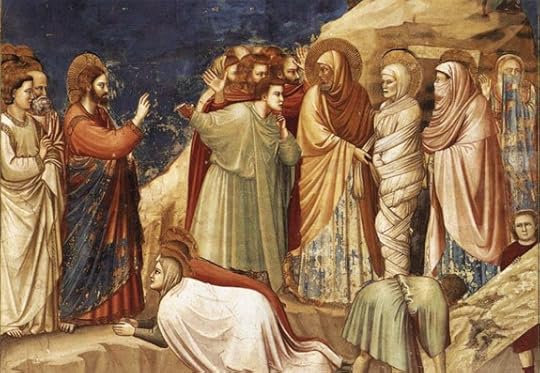
"Raising of Lazarus" by Giotto di Bondone (c. 1304-06)
A Scripural Reflection on the Readings for April 6, 2014 | Fifth Sunday of Lent | Carl E. Olson
Readings:
• Ez. 37:12-14
• Psa. 130:1-2, 3-4, 5-6, 7-8
• Rom. 8:8-11
• Jn. 11:1-45
“Lazarus, come out!”
With that simple, dramatic command, the Incarnate Word spoke words that demonstrated his power over death. It concludes one of the most fascinating stories in the Fourth Gospel, St. John’s account of the last of seven miraculous “signs” performed by Jesus Christ.
Let’s start at the beginning. Jesus’ close friend, Lazarus, the brother of Mary and Martha, had been very ill. When Jesus received word that Lazarus was on the cusp of death, he did not hurry to his friend’s deathbed, but waited two more days before journeying to Bethany, just a couple of miles from Jerusalem. The illness, he told the disciples, would not “end in death, but is for the glory of God, that the Son of God may be glorified through it.” Those words could also be applied, in an even deeper way, to the sufferings and death of Jesus himself.
And there is no doubt that Jesus was completely aware of his approaching Passion. In fact, the death and raising of Lazarus—Jesus’ final miracle before his Passion—set the stage for the death and resurrection of Jesus himself. This incredible sign in Bethany was a promise and a foreshadowing of what was to come in Jerusalem. It was, so to speak, a warning shot to death itself. “The One who is making his way toward death,” wrote Fr. Hans Urs von Balthasar, “wishes to stare death in the face in advance. That is why he deliberately lets Lazarus die despite the pleas of his friends.” It was also so that the disciples and the others present would believe, for the love of God engenders faith and provides hope in the face of darkness, suffering, and death.
This is evident in the moving words of Martha, who expressed some bewilderment at the delayed arrival of Jesus—“Lord, if you had been here…”—but then remarked, with fragile faith, “But even now I know that whatever you ask of God, God will give you.” To which Jesus simply stated, “Your brother will rise.” St. Peter Chrysologus wrote of this exchange: “This woman does not believe, but she is trying to believe, while her unbelief is disturbing her belief.” It is a perfect description of so many of us, wanting to believe more and to believe more deeply, but struggling to believe amid the tumult of this earthly life.
Martha expressed her belief in “the resurrection on the last day”, but it sounds, I think, somewhat forced and obligatory. She knew what she should believe, but at that moment, she wasn’t sure what she believed. Which is why Jesus uttered these profound and transforming words: “I am the resurrection and the life, whoever believes in me, even if he dies, will live, and everyone who lives and believes in me will never die.” Martha’s faith, which had been tattered and fluttering in the cold winds of death, was revived and enlivened. Asked by the Word if she believes his words, she confessed her faith, just like Peter: “I have come to believe that you are the Christ, the Son of God…” (cf. Matt 16:16).
The Gospel of John is often said to focus mostly on the divinity of Jesus. But it contains one of the most poignant, human moments in all of the Gospels, captured in three simple words: “And Jesus wept.” This was not, however, the loud and emotional wailing that usually accompanied death and funerals, but the tears of a man who bears sorrow but also holds the keys to life.
The Son sent by the Father had entered the world as a babe in a dark cave. Obeying the will of the Father, he would soon be carried as a man into a dark tomb for burial. But there, standing between those two events, he stared into the cave and the jaws of death, and cried out in a loud voice, “Lazarus, come out!”
And, we believe and know, the dead man came out. Alive.
(This "Opening the Word" column orgiinally appeared in the April 10, 2011, edition of Our Sunday Visitor newspaper.)
Mysticism, Monasticism, and the New Evangelization
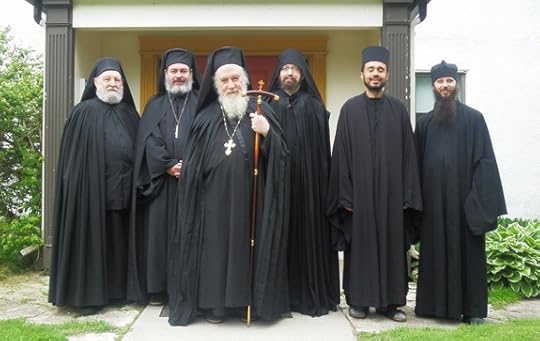
Mysticism, Monasticism, and the New Evangelization | Abbot Nicholas Zachariadis and Benjamin Mann | CWR
The New Evangelization requires a rediscovery of Christian mysticism, and a revival of the monastic setting which is its natural home
“If God exists, He must be felt. If He is Love, it must be experienced and become the fact of one's inmost life. Without spiritual enlightenment, all is an idle talk, like a bubble which vanishes under the least pressure. Without the awakening of the religious sense or faculty, God is a shadow, the soul a ghost, and life a dream.” — Soyen Shaku, Zen For Americans
“Put out into deep water, and lower your nets for a catch.” — Luke 5:4
The first two topics of this article are not often associated with the third. Many people think of Christian mysticism and monasticism as strictly “in-house” matters, too remote and esoteric to have any bearing on the Church’s re-evangelization of the post-Christian West.
While Catholics generally respect the contemplative vocation, they may see it as peripheral to supposedly more urgent concerns, such as improving catechesis and the liturgy, or bearing witness to faith and morality in public life.
Those concerns are critical. But we believe the New Evangelization of historically Christian countries also requires a rediscovery of Christian mysticism, and a revival of the monastic setting which is its natural home.
The Church has a new task in our time: to re-evangelize regions that are falling away from the faith. Most inhabitants of this post-Christendom are not atheists: many of them are open to “spirituality,” though skeptical toward “religion.”
This public hunger for spirituality reflects a legitimate need. Christians must rediscover the mystical core of the Gospel, and present it to the world through the witness of monasticism.
We have written this article to outline the urgency of both tasks, and their inseparability from one another. To re-evangelize the West, the Church must recover its mystical heritage – but this task requires contact with the living monastic tradition. Monasteries are thus essential to the New Evangelization.
Sympathizing with the “Spiritually Independent”
Though their cultural prominence is new, and their identifying label of recent vintage, the “spiritual but not religious” are no new phenomenon. Great heresies, and even some major world religions, have sprung from the minds of those who sought mystical experience without structure and authority.
Ultimately, we need both mysticism and structure.
April 4, 2014
John XXIII and the Jews
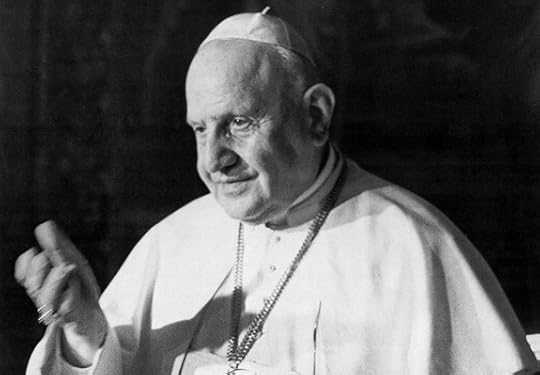
Pope John XXIII is pictured in this undated photo. (CNS photo)
John XXIII and the Jews | Thomas L. McDonald | CWR
How the personal experience of Angelo Roncalli during World War II changed the course of Catholic-Jewish relations
The press called him a caretaker pope. Elected on October 28, 1958, at the age of 77, he was expected to warm the Chair of Peter for a few years without making any great waves. They could hardly have been more wrong.
The people called him Good Pope John because of his genial nature, and few popes have been more loved.
His successor, Paul VI, hailed him as “an incomparable pope.”
But the Jews had a special relationship with John XXIII, and it is their love for him that brought Rabbi David G. Dalin to Seton Hall University, in South Orange New Jersey. On March 30, he delivered a guest lecture for the Institute of Judeo-Christian Studies to reveal the fruits of his research into the life and actions of Pope John and his impact on the Jews of the 20th century.
“In the Jewish community,” says Rabbi Dalin, “he has been recognized and revered, together with Pope John Paul II, as one of the 20th century’s greatest papal friends and supporters of the Jewish people. Catholics are anticipating the day of their shared canonization. I think that’s being anticipated with a great deal of reverence, happiness, and gratitude by the Jewish community as well.”
Rabbi Dalin, professor at Ave Maria University and an expert on American Jewish history and Catholic-Jewish relations, has sailed into controversial waters before to tell the true stories of popes and Jews. His book The Myth of Hitler's Pope: How Pope Pius XII Rescued Jews from the Nazis (Regnery: 2005) soundly debunked defamatory and grossly inaccurate books by Garry Wills and John Cornwell, who both claimed that Pius did nothing to help the Jews. In fact, Dalin’s research showed that Pius had been instrumental in saving perhaps hundreds of thousands of Jewish lives.
Rabbi Dalin didn’t let the issue rest there, but went on to identify the real man who was “Hitler’s cleric,” the Grand Mufti of Jerusalem, Haj Amin al-Husseini, in Icon of Evil Hitler's Mufti and the Rise of Radical Islam (with John Rothmann, Random House: 2008) and the impact of John Paul II on Jews in John Paul II and the Jewish People: A Jewish-Christian Dialogue (editor, with Matthew Levering, Rowman & Littlefield: 2008).
Now he’s gone back to the archives to fill in more of the story of 20th-century Jewish-Catholic relations by exploring the life and actions of Angelo Roncalli, first in his career as a diplomat and cardinal, and then as pope.
Scholar, diplomat, friend of the Jews
Born into a family of poor tenant farmers on November 25, 1881, Roncalli was ordained in 1904.
April 3, 2014
Delving Into The Protestant's Dilemma

Delving Into The Protestant's Dilemma | CWR | Christopher White
An interview with author and apologist Devin Rose about how the Reformation's consequences point to the truth of Catholicism
During the Lenten season Catholics devote special time for prayer, penance, and acts of charity in preparation for Easter. However, a sometimes overlooked—yet integral—part of this liturgical season is that it’s also a special and important time for candidates preparing to convert to the Catholicism at the Easter Vigil.
In 2001, Devin Rose underwent that same process and today he’s an active Catholic apologist, specializing in answering Protestant objections to Catholicism. His new book, The Protestant's Dilemma: How the Reformation's Shocking Consequences Point to the Truth of Catholicism (Catholic Answers, 2014),offers a catechetical style manual that addresses common Protestant critiques with insightful and accessible explanations.
Recently, Catholic World Report spoke with Rose about his new book.
CWR: Your own personal journey from Protestantism to Catholicism began as you considered the fact that Catholics have seven more books in our Bible than Protestants do. Why would this really matter?
Rose: It matters because the doctrines we believe in come from the Scriptures, God’s revelation. If we are missing books, we will be either omitting doctrines or erring on doctrines because we lack part of the divine revelation that God gave to us. If we include spurious books that God did not inspire, we will mistake mere human ideas for divine truth and err that way.
Knowing the canon of Scripture with ironclad certainty is essential in both the Catholic and Protestant paradigms.
CWR: Protestants, as you note, strongly reject the papacy because they see it as granting power and privilege to one man. Is the papacy really Biblical, and if so, do we really need it?
Rose: The papacy is Biblical. However, like many truths of our Faith, the Holy Spirit has deepened the Church’s understanding of these truths over the centuries. So we don’t find exhaustive explanations of, say, papal primacy in the Bible. Instead we find actions done and promises made by Christ that only make sense if God established St. Peter and his successors as the principle of unity of His Church. We need it because God decided we needed it.
CWR: Many Protestants still adhere to the Nicene Creed that affirms belief in "One, holy, catholic, and apostolic Church." Have they simply changed the meaning of these four marks of the church or are we in agreement here?
April 2, 2014
Country Star Turns Catholic
Collin Raye's Biography, now available from Ignatius Press!

Renowned country singer Collin Raye’s new autobiography, A Voice Undefeated, takes readers into the intimate, personal struggles of an international star finding faith amidst crises and critical acclaim. The book includes a FREE bonus DVD, featuring an exclusive interview and live performances of some of Collin Raye’s most beloved songs.
Also available as an eBook, which includes a BONUS epilogue featuring heartwarming and inspirational stories of Collin Raye and his encounters with other celebrities around the world over the years of his musical career.
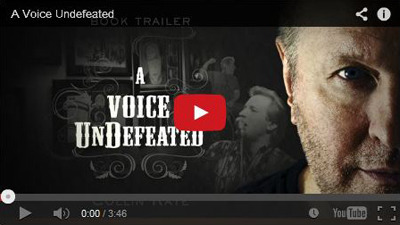
Learn More
Praise for A Voice Undefeated
"A treasury of information about a fascinating man who has captured many hearts with his music and charisma. Collin's story is heartrending and heartwarming . . . a witness of how the goodness of God can work miracles in anyone's life."
- Governor Mike Huckabee
------------------------------
"A must-read book to meet the real Collin Raye, a fascinating bundle of seeming contradictions. He was raised in the Christianity of the Bible Belt, but was drawn to the Catholic Church. He dreamed of being a rock star, but became a top-of-the-charts country western singer. He sought fame and fortune, but valued nothing more highly than being a father and making the kind of music that lightens the load of others. "
- Raymond Arroyo,
EWTN Host, The World Over,
New York Times Bestselling Author
------------------------------
"Like the biblical Psalmist who sang God's praises at time of exhilarating joy and devastating sadness, Collin Raye, gifted with a compelling faith and rich talent, carries the reader of his autobiography through life experiences of "indescribable joy" and "heart dissolving pain". Never doubting that God's guiding hand was upon him at every moment, Collin's struggle to integrate his faith into the whole of life is both inspiring and challenging to fathers, husbands and everyone who, despite our own brokenness, strives to be a witness to Jesus at home, at work and wherever we are. The guiding truth of Collin Raye's life story is well described in I John 4: 16: 'We have come to know and believe in the love God has for us.' "
- Most Rev. Ronald Gainer,
Bishop of Lexington, Kentucky
See more reviews on the Ignatius Press website.
For a limited time* Ignatius Press is offering a special 20% off discount on A Voice Undefeated and Raye’s hit album His Love Remains . Preview the album now.
Enter coupon code VUD2014 at checkout to get the special offer.
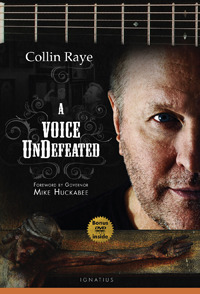
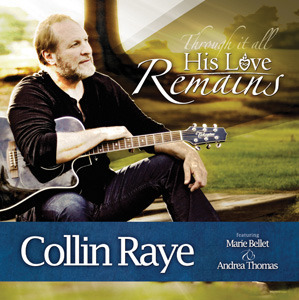
* Offer ends Wednesday, April 9th, 2014 at 12:00 midnight EST. This offer is available online only through Ignatius.com
Buy Now!
Don't Miss Collin Raye discuss his new autobiography,
Live on the Radio
Thursday, April 3rd, 2014 at 9:15am ET
Teresa Tomeo interviews Collin Raye on Catholic Connection on EWTN Radio and Ave Maria Radio
Thursday, April 3rd, 2014 at 2pm ET
Jim and Joy Pinto interview Collin Raye on At Home With Jim and Joy on EWTN Radio
follow on Twitter | friend on Facebook | forward to a friend
Copyright © 2014 Ignatius Press, All rights reserved.
New: "The Leaves Are Falling: A Novel" by Lucy Beckett
Now available from Ignatius Press:
The Leaves Are Falling: A Novel
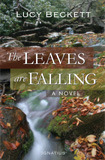
by Lucy Beckett
An octogenarian bookseller living alone in London has found a description of his father, as a young doctor in 1920s Breslau, in a story about Weimar Germany. Perhaps his own story might be worth telling?
In 1945, as a sixteen-year-old boy rescued from the ruins of Europe, he arrives at a Yorkshire farmhouse. Working on the farm for two years in the strange atmosphere of rural England immediately after World War II, he learns to deal with his memories of what happened to him and to his family and to trust, up to a point, those around him in a foreign country.
London in 1947 is stranger still. But the boy is lucky, as he has been since 1941, when marksmen tried to shoot him into a pit full of corpses in a Lithuanian forest. The year before, different executioners in a different forest further east had shot and killed his father.
Those who faced the worst atrocities of World War II, which were inflicted on people in the "bloodlands" of eastern Poland and western Russia, knew that there was little to choose between the two mighty machines, Nazi and Soviet. How was it possible for the individual to survive the crushing wheels of ideology, terror, and mass murder with his integrity intact? The Leaves Are Falling, a sequel to A Postcard from the Volcano but a stand-alone story, explores this question.
Lucy Beckett lives in Yorkshire and was educated at Cambridge University. For many years she was a professor of literature at Ampleforth Abbey. Her books include In the Light of Christ, a comprehensive study of the Western literary tradition; The Time before You Die, a novel about the English Reformation; and A Postcard from the Volcano. These have been warmly praised on both sides of the Atlantic. She is married and has four children.
Praise for The Leaves Are Falling:
"A gripping novel with complex characters who wrestle with some of the most difficult questions of the human experience, The Leaves Are Falling is the kind of book that stays with the reader for a long time."
- Jennifer Fulwiler, Author, Something Other Than God
"This novel is beautifully written and deeply felt. It is an unabashed roman philosophique et historique, an elucidation of and reflection upon the predicament of the Jewish community in Poland-Lithuania during World War II."
-Piers Paul Read, Author, ALIVE
"In this paradoxically gentle and powerful novel, Lucy Beckett explores the mysteries of providence at work in the lives of several characters - some of them victims of the atrocities of the Second World War, especially during the Soviet massacre of the Polish officer class at Katyn,Russia, and some of them survivors. It is the story about a boy who is spared, about his father from whom he is separated, and the old man whom the boy becomes. It is about faith and disbelief, grace and truth and the nature of love in a season of desolation. Throughout, the author writes with masterful skill, with unfaltering believability. On every page the reader will encounter a profound understanding of human nature. Beckett is one of the greatest Catholic novelists of our times."
- Michael D. O'Brien, Author, Father Elijah: An Apocalypse
"Leaves Are Falling presents the reader with haunting portraits of two of the most terrible atrocities of the Second World War. The first is seen through the eyes of Josef, a young Jewish boy whose family are murdered by Nazi death squads, while the second story unfolds around Josef's father, Jacob, a Polish Army doctor captured by the Soviets and taken to a place called Katyn. Meticulously researched, Lucy Beckett recreates the bustling streets of Vilna, the Soviet prison camp and the dreary streets of post-war London, charting the political and spiritual struggles of ordinary people caught up in horrific events beyond their control. This book is a stark reminder of the evils unleashed upon an unsuspecting world by both the Nazis and the Soviets, but it is also a moving testament to the courage and humanity of the survivors."
- Fiorella de Maria, Author, Do No Harm
"Anti-Blog?" | An interview with Fr. Joseph Fessio, S.J.
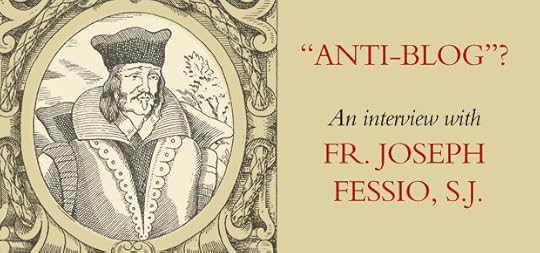
A few weeks ago at lunch Fr. Joseph Fessio announced that he was planning to start an “anti-blog”. It would feature poetry. Of course, we were all intrigued, especially after Father recited some of the poems, first in German, then in translation. This “anti-blog” has now launched at www.AngelicPilgrim.com and features the poems of Angelus Silesius. Each poem is posted in German and English and includes audio of Fr. Fessio reading the poem in German.
Who was Angelus Silesius?
That is the literary name for Johann Scheffler, a 17th century convert from Lutheranism to the Catholic Church. He was born in Silesia in Germany and wanted to be a messenger (Latin: angelus) of God’s love. So he used that name Angelus (messenger) Silesius (from Silesia). He became very well known as a priest, poet, and mystic.
What was Hans Urs von Balthasar’s role in bringing these poems to your attention?
One of Fr. von Balthasar’s great contributions to ressourcement—retrieving the great works of the rich Catholic tradition—was to take selections from the works of important, mainly patristic, Catholic authors and arrange them in a way that showed the inner structure of the author’s thought. He did this, for instance, with St. Ireneus, St. Augustine, and Origen, producing books which were published in the publishing house he established, Johannesverlag. As part of this undertaking, he made a selection from the almost 1700 two-line poems of Angelus Silesius, whom he called “one of the greatest poets in the West” and published them originally as Sich auftun wie eine Rose (open oneself up [to God] like a rose). I read the book years ago and was very inspired by it. But I lent it to someone and it never came back. Somehow my interest was recently renewed and I obtained another copy, now published with the title Cherubinischer Wandersmann (Angelic Messenger, which is the same title as the original complete collection).
It seems that unlike prose, poetry is really still part of an oral tradition; poems don’t really come alive unless they are vocalized. Is that why you are posting these in audio format as well as text?
April 1, 2014
Country Music Star Collin Raye Releases Powerful Memoir: "A Voice Undefeated"
A Voice Undefeated chronicles inspirational story of faith, tragedy and triumph
SAN FRANCISCO, April 1, 2014 – Collin Raye is one of America’s best-loved country music singers, with 24 Top Ten Singles, including 16 No. 1 hits and a total of five straight platinum and two gold albums, a record for the Epic label. But perhaps most noteworthy is Raye’s remarkable personal story outside of country music, which includes his conversion to Catholicism; overcoming a devastating tragedy in his family; and his profound advocacy and love for the poor and disabled. Raye chronicles his unique and unforgettable religious journey and life as a country music star in his new memoir, A VOICE UNDEFEATED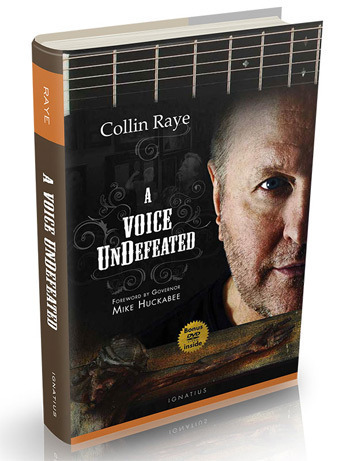 .
.
In A VOICE UNDEFEATED, Raye gives readers a down-to-earth account of his personal and professional life. From his childhood in Arkansas and Texas through his days with the Wray Brothers Band in Oregon and Reno to his rise to international stardom, Raye discusses his journey to the top of the music world and provides an intimate diary of a Catholic who has relied upon his faith to overcome great professional and personal losses — most recently, his beloved 9-year-old granddaughter, Haley, who died in 2010 from an undiagnosed neurological disease. Since Haley’s death, Raye has become an outspoken advocate for the sick and disabled, and has established the Haley Bell Blesséd Chair Foundation to provide wheelchairs to families with special needs children.
Raye also provides a revealing look inside Nashville: His climb to the top of the charts and production of hit after hit; his fallout with the giants of the industry; and his strong criticism of today’s raunchy lyrics that tear down our culture and war against the great country traditions.
“Collin Raye’s belief that an artist’s real success is in the quality and artistry of his work makes him a good showman,” says Mother Dolores Hart, author of THE EAR OF THE HEART. “The love he discovers though his faith in God makes him a great man.”
For more information, to request a review copy, or to schedule an interview with Collin Raye, please contact Kevin Wandra (404-788-1276 or KWandra@CarmelCommunications.com) of Carmel Communications.
More about the book, now available from Ignatius Press:
When Collin Raye's powerful, golden voice dazzled the country music scene in 1991 with his Number One hit single "Love, Me", country music listeners fell in love with one of the great voices of our time. A new star was rising, and Collin's success continued throughout the nineties with over eight million records sold.
Raye's autobiography, A Voice Undefeated, gives readers a down-to-earth account of the author's personal and professional life. From his childhood in Arkansas and Texas through his days with the Wray Brothers Band in Oregon and Reno to his rise to international stardom, this book is both a journey to the top of the music world and an intimate diary of a soul that has suffered great professional and personal losses.
Many who love Collin Raye, the successful country music artist, don't know much about Collin Raye, the man, and the many trials he has endured with faith and courage. Most recently his beloved nine-year-old granddaughter, Haley, died in 2010 from an undiagnosed neurological disease. Since Haley's death, Collin has become an advocate for the sick and disabled and has established the Haley Bell Blesséd Chair Foundation to provide wheelchairs to families with special needs children.
This is a remarkable, inspirational story told by the man who lived it. It is a story of faith, of struggle, of suffering, of profound love, and ultimately of triumph in the midst of tragedy.
Includes 32 pages of color photos.
Includes DVD of never-before-seen personal interview and three songs written by Collin, "Undefeated", "She's With Me", and "Give Me Jesus" that are intimate to his story.
Collin Raye is one of America's best-loved country singers. He produced twenty-four Top Ten singles, of which sixteen were Number One hits, and a total of five straight platinum and two gold albums, which is a record for the Epic label to this day. He is an advocate for sick and disabled persons and continues to perform live throughout the country.
Learn more about A Voice Undefeated at: www.CollinRayebook.com
Praise for A Voice Undefeated:
"It was no coincidence that Collin Raye's signature piece of music was ‘Love, me'. His belief that an artist's real success was in the quality and artistry of his work made him a good showman. The love he discovered in his faith in God and his conversion made him a great man. His book, in his honesty and drive for real perfection, is a story written in mystical sensitivity. It is beautiful to discover how this boy from seedy bars, fairs and casinos, southern rock and jazz, became a voice undefeated for Christ."
- Mother Dolores Hart, Author, The Ear of the Heart
"With talent, drive, and hard work, Collin Raye reached the top of his game and was even once called the ‘star quarterback' of country music. His heartfelt story of perseverance and ongoing conversion is sure to encourage anyone striving to live by faith in a secular world."
- Marcus Grodi, EWTN Host, The Journey Home
"The sharp shadow of suffering has fallen across the life of Collin Raye in ways that would have felled lesser men. But, as the Bowie County hit-maker knows well, even the shadows are nothing without the Light. Through the astounding musical gift that earned him five Grammy nominations (and counting), Raye has a rare knack for transforming all that suffering into an experience of indescribable consolation. He's all about stories, and those told here are too unlikely to be fiction! Whatever your taste in music, A Voice Undefeated is part spiritual confession, part show biz memoir, and part rich slice of Americana."
- Patrick Coffin, Radio Host, Catholic Answers
"Like the biblical Psalmist who sang God's praises at time of exhilarating joy and devastating sadness, Collin Raye, gifted with a compelling faith and rich talent, carries the reader of his autobiography through life experiences of "indescribable joy" and "heart dissolving pain". Never doubting that God's guiding hand was upon him at every moment, Collin's struggle to integrate his faith into the whole of life is both inspiring and challenging to fathers, husbands and everyone who, despite our own brokenness, strives to be a witness to Jesus at home, at work and wherever we are. The guiding truth of Collin Raye's life story is well described in I John 4: 16: 'We have come to know and believe in the love God has for us.' "
- Most Rev. Ronald Gainer, Bishop of Lexington, Kentucky
"A must-read book to meet the real Collin Raye, a fascinating bundle of seeming contradictions. He was raised in the Christianity of the Bible Belt, but was drawn to the Catholic Church. He dreamed of being a rock star, but became a top-of-the-charts country western singer. He sought fame and fortune, but valued nothing more highly than being a father and making the kind of music that lightens the load of others. "
- Raymond Arroyo, EWTN Host, The World Over, New York Times Bestselling Author
"If there were ever a book to show modern day believers that in the end nothing matters but faith and family, then Collin's book is it. Despite becoming a country music superstar, Collin is breathtakingly truthful and transparent about how fleeting fame and fortune can really be. His fans will find his roller-coaster journey to the top of the charts fascinating but it is his walk with the Lord and into the Catholic church that is truly compelling, heartwarming, and challenging all at the same time. Collin illustrates how the Church's teaching on suffering and end of life issues carried him through some of the darkest times. Readers will also get the real scoop on the music industry and learn why Nashville has in many ways gone the way of the culture; losing its soul for the sake of profit. A Voice Undefeated is simply a great read all around offering valuable lessons no matter where a person is faith wise."
- Teresa Tomeo, Motivational Speaker, Best Selling Author, Syndicated Catholic Talk Show Host
"A treasury of information about a fascinating man who has captured many hearts with his music and charisma. Collin's story is heartrending and heartwarming . . . a witness of how the goodness of God can work miracles in anyone's life."
- Governor Mike Huckabee
"Powerful stuff! Collin Raye has faced it all, in life and in the oftentimes treacherous music business. Collin uses every setback to generate a step forward to a new level of his life and career. Read his story and learn from one of the strongest souls you'll ever meet."
- Lorianne Crook & Charlie Chase, Radio Hosts, The Crook & Chase Countdown
"Collin Raye has always stood up for causes that are near to his heart. A Voice Undefeated gives us a glimpse into his personal family life and heartaches, his music career, and his profound love of music. His analysis of today's music culture and his courageous challenge to Nashville to recapture the legacy of its roots is a stark reminder of the gift we all inherited from the great legends of Country music."
- Bobby Roberts CEO, The Bobby Roberts Company, Inc
March 31, 2014
New: "Tobit's Dog: A Novel" by Michael N. Richard
Now avaiable from Ignatius Press:
by Michael N. Richard
Despite the ever-present oppression of the Jim Crow South around him, Tobit Messager had become a prosperous and well-respected man. Then one day forces beyond his control start a cascade of misfortune that leaves him blind and nearly destitute. It is then that an affable travelling musician, who calls himself Ace Redbone, shows up on his doorstep claiming to be a distant relative.
In an effort to alleviate his family's dire situation, Tobit allows his son, Tobias, to accompany Ace Redbone on a quest to collect a long overdue debt. Together, Ace, Tobias, and a most peculiar dog named Okra set off on a journey that will lead to unexpected consequences. Currents of grace begin rippling through not only Tobit's family but his entire community as hidden crimes are revealed and justice, which had almost been despaired of, is served.
This retelling of the biblical story of Tobit, set in North Carolina during the Depression, brings to life in surprising ways the beloved Old Testament characters, including the important but often overlooked family dog.
Michael Nicholas Richard was born in Saco, Maine. He has lived most of his life near New Bern, North Carolina. His short stories have been published in small press, magazine, and paperback markets. He lives with his wife of 35 years and their two dogs.
Praise for Tobit's Dog:
"Richard's transparent writing style gives us a charming story and a strong theme, with realistic, convincing characters that we care about, who exhibit genuine love and gentleness in a challenging culture. It's a believable story whose characters we know are real from our own experience, even though they are mostly of another time. This book would make a great movie!"
- Peter Kreeft, Author, Jacob's Ladder: 10 Steps to Truth
"Tobit's Dog is a sturdy tale in the journey genre, with hope, love, faithfulness, and spirituality wrapped into it. An ancient story retold and repopulated in a fresh and vibrant manner, it is a praiseworthy contribution to possibly America's most unsung and yet important literary cultures, anchored in the fiction of Walker Percy and Flannery O'Connor."
- James Casper, Author, Everywhere in Chains
Carl E. Olson's Blog
- Carl E. Olson's profile
- 20 followers




